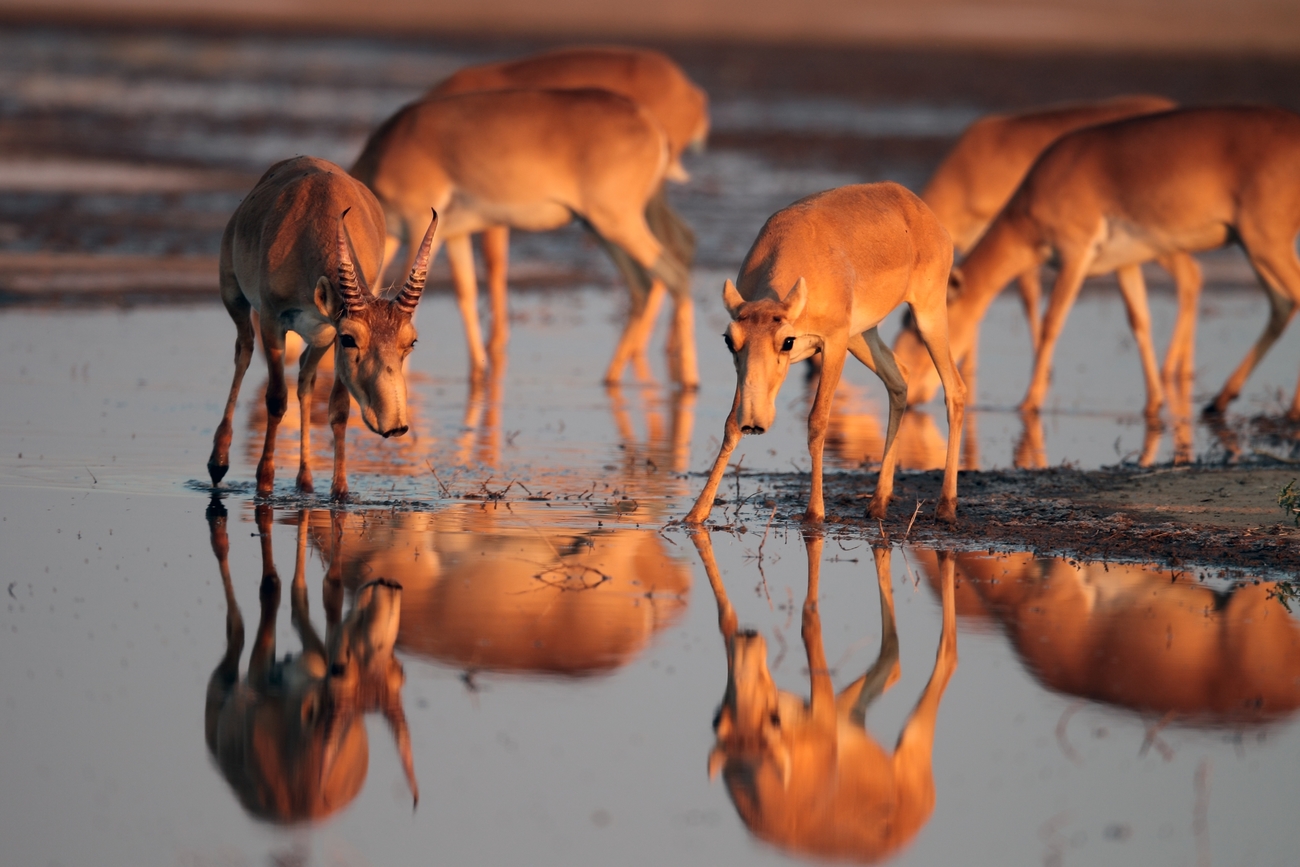conservation body compromises on critically endangered saiga antelope
conservation body compromises on critically endangered saiga antelope

(Geneva, Switzerland) – Governments today turned down the opportunity to give the critically endangered saiga antelope the highest protection (Appendix I) from international trade at the 18th Conference of the Parties (CoP18) of the Convention on International Trade in Endangered Species of Wild Fauna and Flora (CITES), instead agreeing by consensus to formalise a current voluntary agreement by saiga range states not to export any saiga horns.
“IFAW welcomes increased attention for this remarkable antelope,” said Dr Masha Vorontsova, IFAW expert. “Saiga antelope desperately need protection if they are to survive and thrive – we’ve already lost almost 80% of the population of the species in a single decade due to their susceptibility to disease, loss of habitat, poaching for their horns and illegal trade. If ever there was a time to act it is now – while we believe saigas should have been afforded the highest level of protection under CITES, we nonetheless welcome the decisions to formalise the existing voluntary ban on trade in new saiga horn”.
CITES CoP18 opened in Geneva, Switzerland on August 17th and runs until August 28th.
Saiga antelope will now retain their CITES Appendix II listing which seeks to ensure commercial trade will not be “detrimental to the species”. However, currently all saiga range States observe a voluntary moratoria on international export of saiga products as well as laws against hunting and domestic trade in saiga and saiga parts and products. Governments at CITES opted to make this voluntary moratoria an official CITES zero commercial quota.
“Illegal and unsustainable wildlife trade, coupled with habitat loss and other human-made threats, has decimated many species so that they are now at a tipping point for future survival. As long as legal markets exist for trade in critically endangered wildlife, the potential exists for an illegal market which launders parts and products of poached wildlife,” said Dr Vorontsova.
“The many recent seizures of saiga horn demonstrate the determination of criminals to launder saiga horns into consumer markets. The devastating impact of saiga poaching is demonstrated by populations skewed heavily towards females as only male saiga bear the horns that are mercilessly poached from them for use in traditional medicine. Horns can fetch prices far in excess of those paid for ivory.”
The proposal was submitted by Mongolia (a saiga range state) and the United States but following objections by the other saiga range states, Russia and Kazakhstan, a compromise was agreed to make the existing voluntary agreement not to trade horns into an official zero quota for commercial exports under the CITES system.
Originally occurring across a vast territory of Asia, the antelope with the elongated nose is now limited to a much more confined part of Russia and Kazakhstan and Mongolia. Only 4,000 saiga currently remain in the wild in Russia, with around 4,900 in Mongolia and more than 150,000 in Kazakhstan.
Still to come under consideration on today’s agenda at CoP18 are giraffes, otters, rhinos and elephants.
IFAW works in more than 40 countries, to rescue and protect animals and their habitats, for a world where animals and people can thrive together. A team of IFAW experts are attending CITES CoP18 and are available for interview throughout.
Ends
For more information or to arrange interviews with IFAW experts please contact Clare Sterling on mobile +44 (0)7917 507717, email csterling@ifaw.org, or Christina Pretorius on mobile +41 779 114253 or +27 (0) 82 330 2558, email cpretorius@ifaw.org Skype interviews can be arranged on request.
CITES information and documents are available here: https://www.cites.org/eng/cop/index.php
IFAW is tweeting updates from the proceedings via various accounts including @Action4IFAW http://twitter.com/action4ifaw and @IFAWUK https://twitter.com/ifawuk
Images and footage will be available for media use.
About the International Fund for Animal Welfare (IFAW) - The International Fund for Animal Welfare is a global non-profit helping animals and people thrive together. We are experts and everyday people, working across seas, oceans and in more than 40 countries around the world. We rescue, rehabilitate and release animals, and we restore and protect their natural habitats. The problems we’re up against are urgent and complicated. To solve them, we match fresh thinking with bold action. We partner with local communities, governments, non-governmental organisations and businesses. Together, we pioneer new and innovative ways to help all species flourish. See how at ifaw.org
Related content
Every problem has a solution, every solution needs support.
The problems we face are urgent, complicated, and resistant to change. Real solutions demand creativity, hard work, and involvement from people like you.